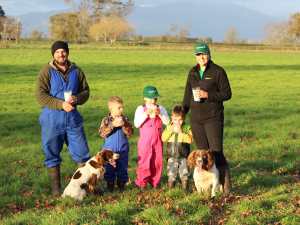DairyNZ opens applications for associate director role
DairyNZ is giving New Zealand farmers a unique opportunity to gain hands-on governance and leadership experience within the dairy sector.
 : Dairy farmers Nic and Kirsty Verhoek and their children Ferguson, Isabelle and Lachlan raise glasses of milk to toast World Milk Day.
: Dairy farmers Nic and Kirsty Verhoek and their children Ferguson, Isabelle and Lachlan raise glasses of milk to toast World Milk Day.
Tomorrow (June 1) is World Milk Day.
Dairy has long been the powerhouse of the New Zealand economy, significantly contributing to local communities and regional economies, while providing quality and trusted nutrition around the world.
Dairy generated $25.5 billion in export revenue in the year ended April 2024 and provided direct employment for approximately 55,000 people both on and off farm.
DairyNZ and the Dairy Companies Association of New Zealand (DCANZ) are excited to toast these achievements.
“World Milk Day is a great opportunity to celebrate the role of our farmers, dairy companies and the whole sector in progressing a positive future for New Zealand,” says DairyNZ chief executive Campbell Parker.
The international day was established by the Food and Agriculture Organization of the United Nations to recognise the importance of milk as a global food and to celebrate the dairy sector.
“The milk produced by New Zealand farmers is equivalent to two and half serves of dairy per day for 90 million people. This nutritional contribution starts with our farmers’ commitment to their land and animals and flows through the whole value chain to benefit our customers, communities and the country,” Parker says.
DCANZ executive director Kimberly Crewther says the high-quality milk supplied by farmers is being transformed into more than 1500 different dairy products and product formulations, exported to over 130 countries, and providing one in every four dollars New Zealand earns from trade.
“The sector’s success is due to a huge team effort by farmers, dairy company employees and the many partner industries our dairy farms, processors and exporters couldn’t function without,” says Ms Crewther.
Dairy farmers and dairy companies’ contribution to economic activity includes more than $7.9 billion spent on goods and services in the local economy by dairy farmers and $5 billion spent by dairy processors in addition to their purchases of milk from farmers in the year to March 2023.
Dairy farmers are top 10 purchasers of goods and services from over 1/3 of all other industries and dairy processors are top 10 purchasers of goods and services from 1/4 of all other industries.
Crewther says milk is a nutritional powerhouse and a top 5 source of supply of 23 out of 29 essential nutrients within the global food system. This includes 48% of dietary calcium supply and 12% of protein for only 7% of calories. “Dairy products make an important contribution to diets at every stage of life."
Parker says World Milk Day is an opportunity to acknowledge how central dairy can be within communities – with dairy farmers often contributing to local volunteering, education, conservation, mentoring and the emergency services.
“The dairy sector is an industry I find very easy to get out of bed for every day and get excited about, and DairyNZ will continue working hard to ensure Kiwi dairy farmers remain profitable, sustainable and internationally competitive into the future,” Parker says.
Crewther says the dairy sector is a source of a diverse range of careers for New Zealanders, whether it’s farming, advancing dairy science, manufacturing world class dairy products, connecting New Zealand products with global customers through sales and logistics, or one of the many other roles that support the whole sector to run smoothly.
“With our links around the world, there are exciting opportunities on farms, in dairy companies and dairy sector organisations. The sky’s the limit in our dynamic dairy sector.”
Key facts & figures
NZ dairy sector:
The World Wide Sires National All Day Breeds Best Youth Camp Best All Rounder plaudit has become family affair, with 2026 Paramount Cup winner Holly Williams following in her sister Zara's footsteps.
DairyNZ is giving New Zealand farmers a unique opportunity to gain hands-on governance and leadership experience within the dairy sector.
Herd improvement company LIC has posted a 5.2% lift in half-year revenue, thanks to increasing demand for genetics.
According to the latest Fresh Produce Trend Report from United Fresh, 2026 will be a year where fruit and vegetables are shaped by cost pressures, rapid digital adoption, and a renewed focus on wellbeing at home.
The Roar is a highlight of the game hunting calendar in New Zealand, with thousands of hunters set to head for the hills to hunt male stags during March and April.
OPINION: The past few weeks have been tough on farms across the North Island: floods and storms have caused damage and disruption to families and businesses.

OPINION: Meanwhile, red blooded Northland politician Matua Shane Jones has provided one of the most telling quotes of the year…
OPINION: This old mutt has been around for a few years now and it seems these ‘once in 100-year’ weather…